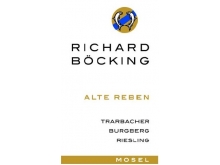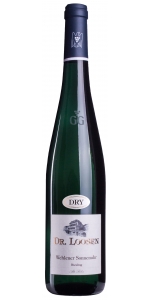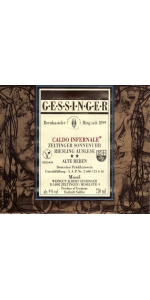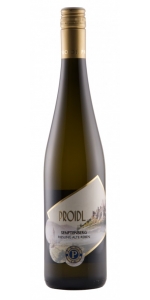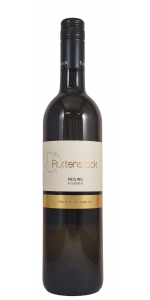Richard Bocking Alte Reben Trarbacher Burgberg 2013
| Country: | Germany |
| Region: | Mosel |
| Winery: | Richard Bocking |
| Grape Type: | Riesling |
| Organic: | Yes |
| Vintage: | 2013 |
| Bottle Size: | 750 ml |
Dr. Loosen Wehlener Sonnenuhr Alte Reben Riesling Grosses Gewachs is made from 100 percent Riesling.
This is one of the greatest vineyards in the Middle Mosel. This precipitously steep, rocky vineyard consistently yields some of the most elegant and sophisticated white wines in the world. Citrus and white peach flavors predominate when the wines are young, turning to a pure expression of the mineral soil as they age.
-James Suckling 94-95 Points
Gessinger Zeltinger Sonnenuhr Riesling Auslese Alte Reben Caldo Infernale made from 100 percent Riesling.
The Zeltinger Sonnenuhr Riesling Auslese Caldo Infernale was produced from over 100-year-old ungrafted vines in the Gewann “im Kalk,” the original part of the vineyard. This is a typical Devonian slate Riesling with fruity elegance and great durability.
Although riper elements of yellow peach, coconut, Victoria pineapple, and almond cream directly capture the attention, the nose maintains a fresh character with minty and zesty notes. The wine shows ripe and sweet elements on the palate, and has quite some creamy and juicy elements such as canned yellow peach and pineapple. The finish brings the right amount of zest to lift up the aromatics and adds focus and tension, while there is an almost Eiswein-type of acidity in the aftertaste. This is a gorgeous Auslese.
Gessinger Zeltinger Sonnenuhr Riesling Auslese Alte Reben Caldo Infernale made from 100 percent Riesling.
The Zeltinger Sonnenuhr Riesling Auslese Caldo Infernale was produced from over 100-year-old ungrafted vines in the Gewann “im Kalk,” the original part of the vineyard. This is a typical Devonian slate Riesling with fruity elegance and great durability.
Although riper elements of yellow peach, coconut, Victoria pineapple, and almond cream directly capture the attention, the nose maintains a fresh character with minty and zesty notes. The wine shows ripe and sweet elements on the palate, and has quite some creamy and juicy elements such as canned yellow peach and pineapple. The finish brings the right amount of zest to lift up the aromatics and adds focus and tension, while there is an almost Eiswein-type of acidity in the aftertaste. This is a gorgeous Auslese.
Proidl Senftenberg Riesling Alte Reben Kremstal DAC is made from 100 percent Riesling
Pale yellow-green, silver glints. Fine herbal savouriness, white peach, mineral nuances, followed by hints of lime, but still rather restrained. Complex, taut, green apple, fresh acidity, citrus-mineral reverberations, and exhibiting length. Definite ageing potential. .
Review:
"Very striking aromas of ripe melon, peaches and ginger. Impressive depth and elegant acidity on the medium-bodied palate. Very long, fresh, bright finish. Sustainable. Drink or hold. Screw cap."
- James SUCKLING (October 10th 2024), 93 pts
Proidl Senftenberg Riesling Alte Reben Kremstal DAC is a white wine made of 100% riesling.
Pale yellow green with silver glints. Fine herbal savoriness with white peach and mineral nuances, followed by hints of lime but still rather restrained.
Complex and taut, green apple, fresh acidity, citrus-mineral reverberations and exhibiting length. Definite ageing potential.
Review:
"A pale chartreuse yellow, with a silver sheen. Subtle floral notes, a hint of lime and white stone fruit, apricot and blossom honey. Juicy, elegant, white peach, a refined acidity, mineral and taut on the finish, precise, good length, with ageing potential. - Peter MOSER"
- Falstaff (April 18th 2025), 93 pts
Ruttenstock Riesling Alte Reben is a white wine made from 100% Riesling.
Delicate peach and charming apricot on the nose. Exotic fresh structure with lots of minerals and fine fruit with a long finish.
A very stony vineyard with old vines makes for higher quality every year.
Richard Bocking Alte Reben Trarbacher Ungsberg 2013 is 100 percent Riesling.
This close-to-dry wine displays the perfect balance between pure, rich fresh fruit (pineapple, lemon and peach) and mineral flavors. Noticeable is a round and rich texture supported by focused slate. This wine can be enjoyed now and through 2015.
Alcohol 12% vol
Residual sugar 10.8 grams / liter,
Acidity: 7.0 grams / liter TA
High bearing potential
Fruit: 100% Riesling Appellation: Traben Trarbach, Germany Vineyard: The fruit for this wine comes from our sustainably farmed vineyards covered in blue and brown slate and quartz. The Ungsberg is known for the extreme pitch of the slopes high above the Mosel River. This wine comes exclusively from old vines (40-60 years old) and from a single vineyard. Vines have been grown on this spot since the 16th Century. Harvest Dates: November 2, 2012; after the first frost. Production Notes: The fruit for this wine is deep, rich and intense, produced only from the best and oldest vines in this vineyard (40-60 years old). It is carefully hand picked later in the season to allow for ideal ripeness. All fruit is painstakingly hand sorted to allow only the best grapes to be crushed for the Single Cru. The juice is fermented by natural occurring yeast only- no added cultures- slowly at cold temperatures until the perfect balance of acidity and fruit is reached. The wine was aged sur lies for 10 months, then aged 100% German in oak barrels. This wine was bottled at the End of July 2013.
Review:
Bottled with 18 grams of residual sugar and 12% alcohol, the 2013 Trarbacher Schlossberg Riesling Alte Reben opens with an intensely floral and concentrated bouquet, whereas its pure, deep, ripe and concentrated fruit aromas (maracuya) emerge only slowly but very precisely. There is a certain relationship to the Chenin Blancs from Svennières, perhaps. Full-bodied, powerful and complex on the palate, this remarkable rich but pure, delicate and well-balanced Riesling from ungrafted, 80-year-old vines on grey and blue slate with quartzite inclusions, reveals a persistent and salty finish which makes this, maybe, the most impressive (but also most powerful) wine of the recently revitalized estate, so far. - Robert Parker 90 Points
The Weingut Richard Bocking Winery
Our story embraces Classic Viticulture on the steep slopes of the Mosel River Valley with a 15-generation family tradition.
The extremely steep, slate-laced hillsides in the central region of the Mosel River offer optimal conditions for producing great Riesling wines. Since 1624 the Böcking Family has been devoted to producing wines of the highest quality – crisp, fruity wines that are the finest a Riesling enthusiast could desire.
The roots of the Böcking family can be traced to the early 17th Century, when the family was appointed regional treasurer under Prince Pfälz-Zweibrücken. Soon thereafter, the family became active in the budding wine production and trading business in Trarbach, purchasing what may be the oldest Riesling vineyard on the Mosel, the Trabacher Ungsberg. The Trarbacher Schlossberg vineyard was acquired soon thereafter.
The Böcking family has lived, loved and passed down the tradition of winemaking, along with portions of four steep-slope vineyards, to successive generations. It is their experience and dedication, combined with decades-old vines growing on rich, mineral soils, that allow the family to continue to produce the finest Mosel Riesling wines.
Recently, Denman Zirkle and daughter Sigrid Carroll, a direct descendant of Richard Böcking purchased the Estate from a cousin, Wolf von Marschall. Denman, along with his daughter, Sigrid Carroll, Wolf’s sister, Leweke von Marschall, and the winegrower, Simon Trös, combined tradition and history with confidence and entrepreneurial vision to lead the family enterprise into the future and reestablish its international following. Their focus is on natural viticulture and production, developing mostly drier Riesling wines to suit contemporary tastes in Germany and abroad.
In 2013, after almost 400 years, Böcking wines were introduced to the U.S. market for the first time. Importation into the United Kingdom began the following year.
In Germany, Böcking wines are being distributed by several large merchants, including Weinkontor Freund ( http://www.weinkontor-freund.de ), one of the largest in Germany. Freund serves over 2,000 restaurants and retail clients, many high end. Until 2014, Freund specialized in wines from Italy, France, Spain and Portugal. When he added Germany in 2014, Richard Böcking is the only winery on the Mosel he chose to represent."
In the United States, Böcking is represented by importer Kysela Pere et Fils, named Importer of the Year in 2013 by Wine Enthusiast magazine. The wines are currently being distributed in the Mid-Atlantic states, District of Columbia, and Montana. Please click here see where to purchase our wines.
The Weingut Richard Bocking Vineyards
The character of the wines is shaped by the distinctive Grand Cru, steep slope vineyards of which Richard Böcking has 15 acres under cultivation. The plantings are 95% Riesling and 5% Spätburgunder (Pinot Noir). Of the five vineyards: Ungsberg, Burgberg, Schlossberg, Huenerberg and Taubenhaus, four are classified as Grand Cru with vintage vines up to 80 years old. The age of the vines force the roots of these grape vines deep into the ground for water and nutrition. Thus, the vines are constantly absorbing their nutrition, even during unseasonably dry periods. The constant nourishment provides vines that are strong, disease resistant, and produce small, compact grapes with an unusual concentration of fruit.
Richard Böcking develops their wines by hand, from the vineyard to the bottle. Unadulterated; with an originality that can be produced only in a natural vineyard environment. From this tenet springs Böcking's fundamental philosophy—a philosophy of allowing a wine to develop naturally. In the steep-slope vineyards, this philosophy means the small vineyard parcels are cultivated individually and by hand. All wines are developed as bio-dynamically as possible, using naturally occurring yeast and introducing only the sparest amount of sulfur. This meticulous attention to natural agriculture and production creates beautifully finished wines while sustaining the vineyards for the future.
- back
There are afternoons with indigo skies when we approach one of the oldest plots of the estate. Our stroll from the winery follows a line of cypress trees to the corner of a path. This angle gives its name to our most exceptional vineyard.
El Picón is the great symbol and the most profound reality. The sum of enigmas in a beautiful, pure fruit. The wine of silence and intimate joy, an eternal taste in which generations, labours and nature’s favors culminate.
Grapes from the plot of El Picón, one of the oldest at the Pago de los Capellanes estate in Pedrosa de Duero.
22 months in 225-litre, extra-fine grain French oak barrels dried over 60 months.
Pago de los Capellanes Finca El Picón is a mature red wine with intense aromas of red and black fruit from the forest accompanied by deep balsamic notes and spicy touches provided by aging. In the mouth it is meaty, deep and very balanced. A medium to full-bodied wine with vibrant acidity and fine, velvety tannins. The finish is long and very persistent.
1.6 hectares of clay loam soil with surface gravel. Very poor fertility and very low vineyard yields.
Siegel Reserve Cabernet Sauvignon Cabernet Uber Cuvee is made from 85% Cabernet Sauvignon, 15% Syrah.
Dark red color, perfumed nose with hints of vanilla. This fruity, cherry flavored wine exhibits round rich flavors that over deliver.
8 weeks of Oak aging, medium toasted barrels, 100% French Oak.
Best with grilled meats and stews.

